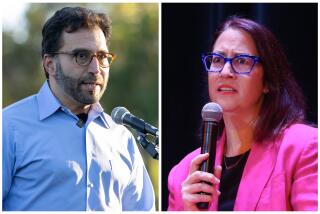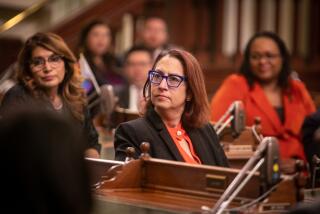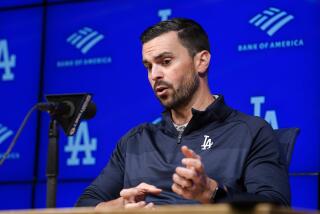New U.S. Ambassador Friedman arrives, stirring hope in Israeli settlement
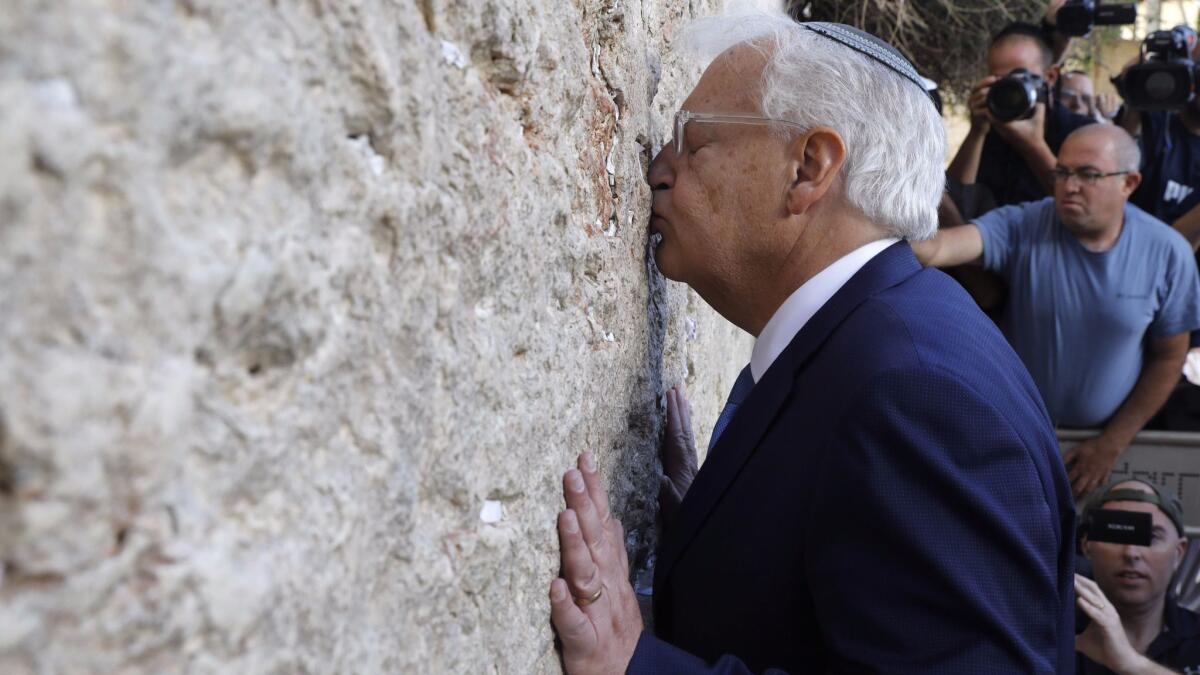
- Share via
Reporting from BEIT EL, West Bank — For years, David Friedman, a controversial New York bankruptcy lawyer who has worked for Donald Trump, helped from afar to build up an Israeli settlement in the occupied West Bank.
Friedman has run a nonprofit that raises millions of dollars for a yeshiva that also funds several schools and news organizations in Beit El, a town of 7,000 people north of the West Bank city of Ramallah.
Photographs show him arm in arm with one of Beit El’s founders. A plaque in the Beit El Yeshiva pays tribute to Friedman’s father as a founding trustee.
As Friedman prepares to take up his post Tuesday as U.S. ambassador to Israel on the eve of President Trump’s visit to the region, residents of Beit El are hoping that he can help soften the U.S. policy against Israel’s settlements in the occupied West Bank.
All Israeli building in the occupied West Bank and East Jerusalem is considered illegal by Palestinians and much of the international community. Many countries, including the U.S., have warned that settlement expansion was endangering prospects for peace through a two-state solution for Israelis and Palestinians.
Many observers wonder how diplomatic Friedman, 57, can be, considering some of his past inflammatory comments. In addition to promoting West Bank settlements, he has called former President Obama and others anti-Semitic because of their criticism of Israel and compared liberal American Jews to Holocaust-era kapos, Jews who collaborated with Nazis in concentration camps. He later said he regretted using hurtful words.
Settlement officials say they hope Friedman can help get a green light for hundreds of new homes at Beit El. They were also optimistic that the ambassador would break with years of U.S. diplomatic protocol and pay a public visit to Beit El and other Israeli settlements in the West Bank, which Palestinians claim as the site of a future state.
And if peace talks between Israelis and Palestinians are revived, residents look forward to their views being relayed to negotiators.
“I’ve got a lot to tell him. The important thing is: I want to build,” said Shai Alon, the head of the Beit El’s local council, as he checked an invitation to a reception Sunday in Jerusalem in honor of the new ambassador. “I’ll say: Come here and see what’s going on.”
Located near a military checkpoint on the outskirts of Ramallah, Beit El boasts palm-tree-lined streets, traffic circles adorned with passages from the Bible, and colorful plastic street ornaments. Muezzin calls to Muslim prayer echo off the surrounding hills.
At the Beit El Yeshiva, a religious seminary that relies on donations raised from the U.S. charity Friedman once headed, worshipers swayed in silence last week in a new study hall decorated with ornate silver and woodcarved colonnades.
It is near a hilltop spot that residents believe is the site of Jacob’s vision of angels on a ladder in the biblical book of Genesis. Beit El was established 40 years ago by the founders of Israel’s Gush Emunim settlement movement.
Beit El gained notoriety as an ideological leader among Israel’s religious Zionists for its well-respected yeshiva, schools and media. The multiple educational institutions run by the yeshiva and its American supporters make the religious seminary the settlement’s largest employer.
Beit El is also known for the yeshiva’s hard-line rabbi, Zalman Melamed, who has supported soldiers refusing an order to evacuate settlements, and was a staunch critic of the left-wing governments that concluded peace accords with the Palestinians in the 1990s.
“Every community has a sugar daddy that helps to give a little bit more than the government gives — that makes the place look nicer and more pleasant to live. We hope that he will continue — as his family has been very positive to Beit El,” said Avi Dobuler, a 27-year resident of Beit El.
Friedman arrived in Israel on Monday and is slated to present his credentials to President Reuven Rivlin on Tuesday. President Trump is expected to arrive in Israel next week as part of the middle segment of his first trip abroad since his inauguration.
Friedman on Monday visited the Western Wall in Jerusalem’s Old City, the site holy to Jews as one of the remnants of the ancient temples. Friedman said he said a prayer for Trump and his upcoming visit.
When Trump first designated Friedman as the ambassador to Israel, settler leaders in Beit El and elsewhere welcomed what they believed was a sign that the United States’ decades-old policies supporting a two-state solution for Israelis and Palestinians was about to change.
The Palestinian leadership, however, has worried about the influence of an advocate for the settlers whom many considered to be to the right of conservative Israeli Prime Minister Benjamin Netanyahu.
“From the people [Trump] appointed you would assume there are settlers in the White House,” Hanan Ashrawi, a Palestinian official, said in a February interview.
Recently, Trump has talked of seeking the “ultimate” agreement between Israelis and Palestinians and hesitated to make good on a campaign promise to move the U.S. Embassy from Tel Aviv to Jerusalem. His visit to Israel and a planned speech Tuesday have fueled swirling speculation that he is working on a new U.S. peace initiative.
Chaim Silberstein, a member of the Beit El council who was a student at the yeshiva in the 1980s, said that when Beit El founder Yaakov Katz came to the U.S. to raise money for the settlement, Friedman’s father, Rabbi Morris Friedman, was one of several individuals in the New York City area who showed the settlement activist around.
Friedman followed in his father’s footsteps, becoming president of the American Friends of Beit El Institutions, which holds an annual gala fundraiser.
As a columnist for the Arutz 7 news website funded by the yeshiva, Friedman wrote during the election campaign that the two-state solution was “an illusion which serves the worst intentions of the United States and Palestinian Arabs.” And during the election campaign he echoed Trump’s promise to move the U.S. Embassy from Tel Aviv to Jerusalem.
During his Senate confirmation hearings this year, he backed off controversial rhetoric about the Israeli-Palestinian conflict and vowed to represent U.S. policy.
“David Friedman will have difficult choices to make. I don’t expect policy to change because the ambassador is a friend…. If he can’t do his job, he’ll lose his job,” said Yehuda HaKohen, a former broadcaster at the yeshiva-funded radio station who lives on a hilltop overlooking Beit El. “I don’t think American interests in the Middle East can coexist with his personal feelings about Judea and Samaria — the West Bank.”
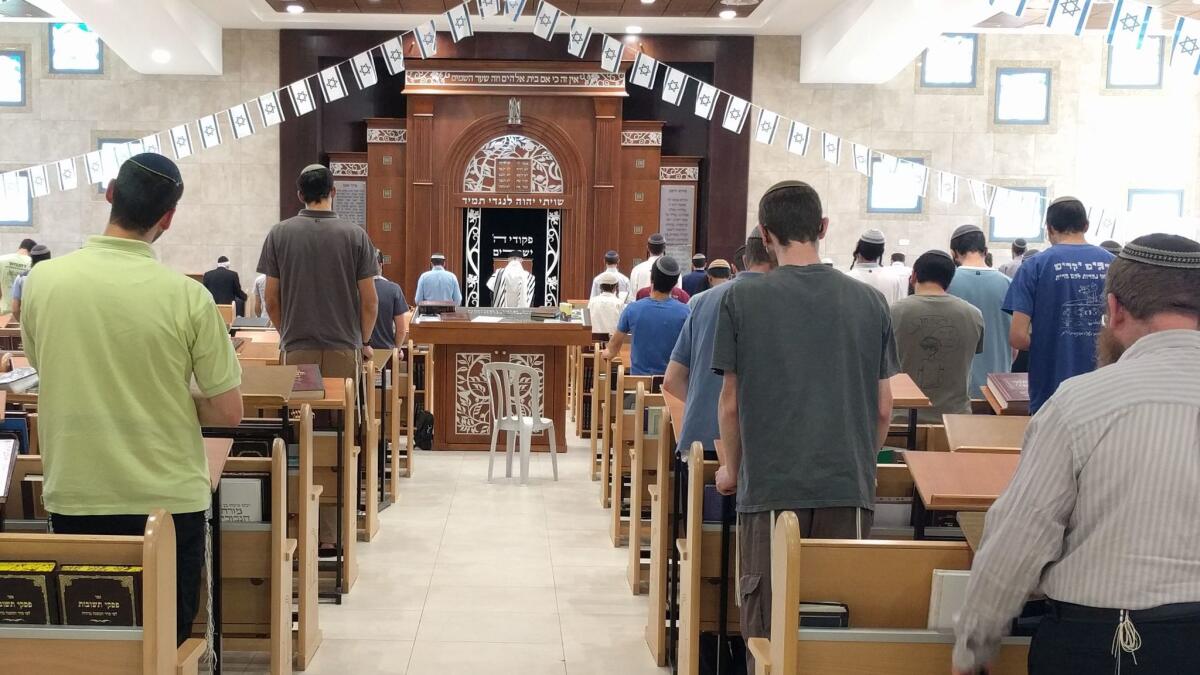
Mitnick is a special correspondent.
Twitter: @joshmitnick
More to Read
Sign up for Essential California
The most important California stories and recommendations in your inbox every morning.
You may occasionally receive promotional content from the Los Angeles Times.
